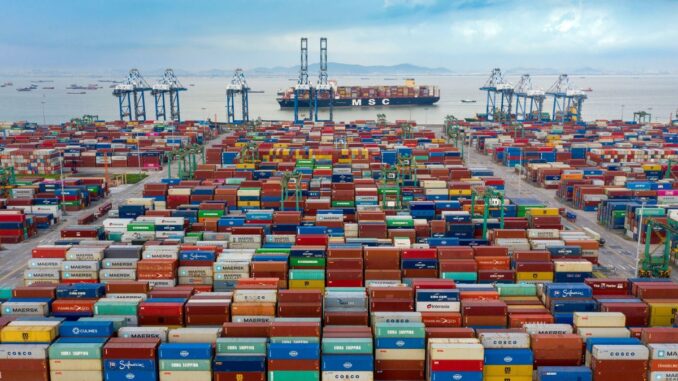
Clearing agents have halted services at the Tincan Island Port amid the controversial 15 per cent National Automotive Council (NAC) levy.
Lucky Amiwero, president, national council of managing director of licensed customs agents (NCMDLCA), disclosed this in a statement on Thursday in Lagos.
On April 23, the agents had planned to embark on a warning strike over the issue, but it was suspended due to the just-concluded holidays.
Amiwero said clearing agents had abandoned vehicle clearance at Port and Terminal Multiservices Ltd., and Five Star Terminal at the Tincan Island Port.
He said there was confusion about Nigeria Customs Service’s (NCS) “shifting” of the 15 per cent NAC Levy to common external tariff (CET).
“Though the Federal Ministry of Finance changed the heading to common external tariff (CET), clearing agents still describe the new levy as illegal,” he said.
“It is not backed by law in Nigeria.
“The shifting from NAC Levy to CET, both 15 per cent, by the NCS, contravenes the principle of World Customs Organisation, Kyoto Convention on the Simplification and Harmonisation of Customs Procedure.
“It also contravenes the World Trade Organisation under the Agreement on Trade Facilitation Agreement which core principle is predictability, consistency and transparency on trade information, fees imposed in connection with importation and exportation.”
Amiwero, who described the CET as alien, said as a result of the confusion, many vehicles had been abandoned at the port, accumulating demurrage and rents.
He expressed worry that the situation would create bottlenecks to revenue collection and constitute an impediment to trade.
According to him, the only approved levy for motor vehicles of 87.03 cars is five per cent which, he said, was legislated on by the national assembly and signed into law by the president.
“CET Levy of 15 per cent on motor vehicles is not backed by any law or approved in the Finance Act of 2020 and 2021 and not provided for in any law of the land,” he added.
“There is no such thing as CET Levy of 15 per cent either on motor vehicles or goods.
“The only approval is on ECOWAS Trade Liberalisation Levy (ETLS) of 0.5 per cent; so, the introduction of CET Levy is strange to our domestic law and the ECOWAS Convention on import duties and levies assessment and collection.”
TRUCK OWNERS PROTEST EXTORTION
Meanwhile, truck owners, on Thursday, protested against extortion at the port.
Abdullahi Inuwa, chief executive officer, Gee Gee Global Enterprises Nigeria Ltd., urged the federal government to give marching orders to security agencies to stop extortion at the ports.
Inuwa, a former vice-chairman, Dry Cargo section of the national association of road transport owners (NARTO), made the appeal in an interview with the News Agency of Nigeria (NAN) in Lagos.
He said extortion, lack of conducive business environment, insecurity and others are hampering the trucking business in the country.
He urged the federal government to create an enabling environment for stakeholders, and also assist truck owners to calm the tension and challenges they are facing.
“On extortion, the government has a good role to play because most of the places that these non-state actors operate are on federal government roads,” he said.
“If matching orders are given to all the security agencies in those areas, that is, from the commissioner, area commander to their deputies, they can do something in that regard.
“It has not been easy lately; the global challenge of COVID-19 had affected businesses and now adding the Ukraine-Russia war, which has also affected importation.
“It is so unfortunate that for so many of us, what we know is the trucking business and as such the numerous challenges in the transport business are adversely affecting us.”
END

Be the first to comment